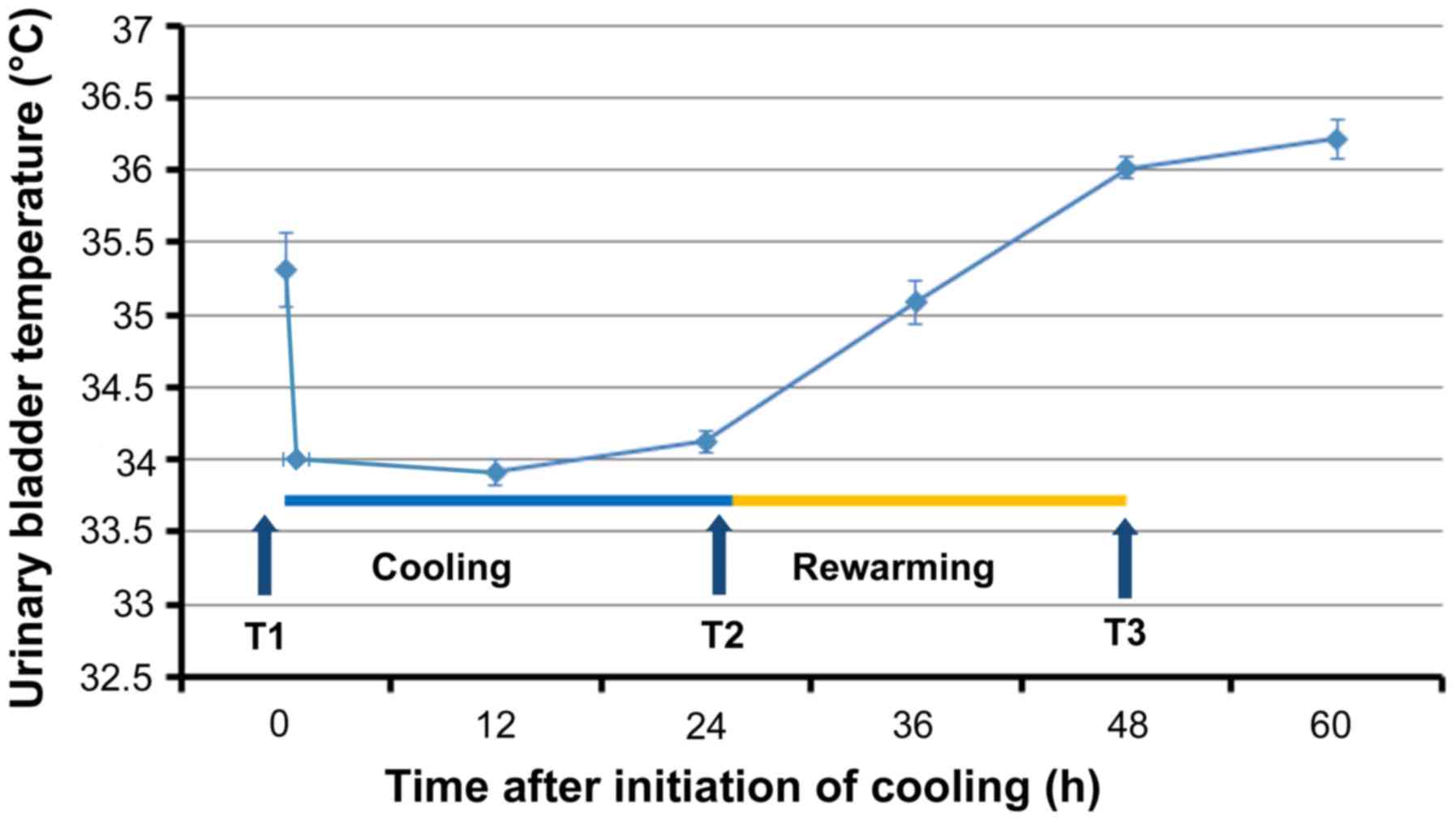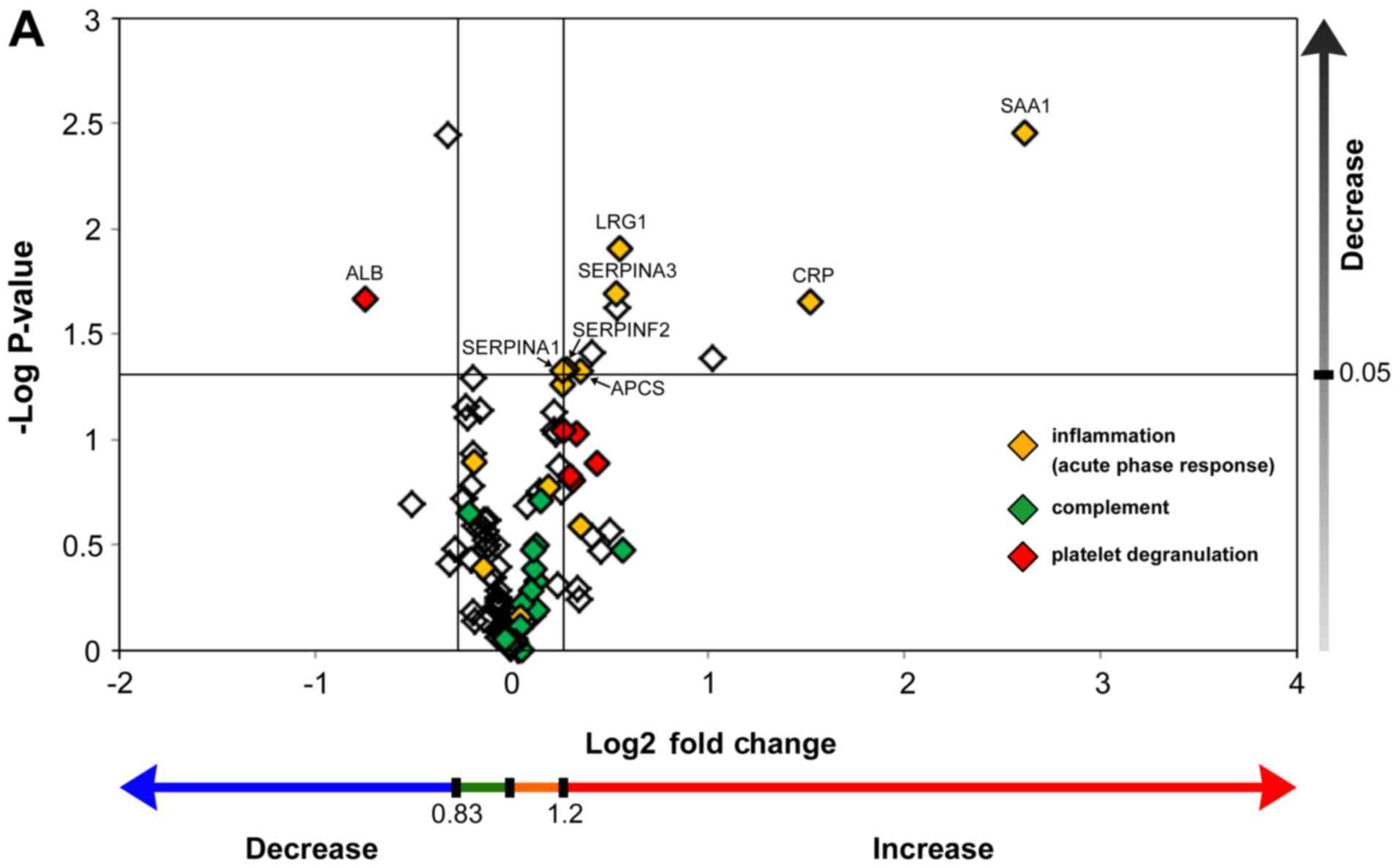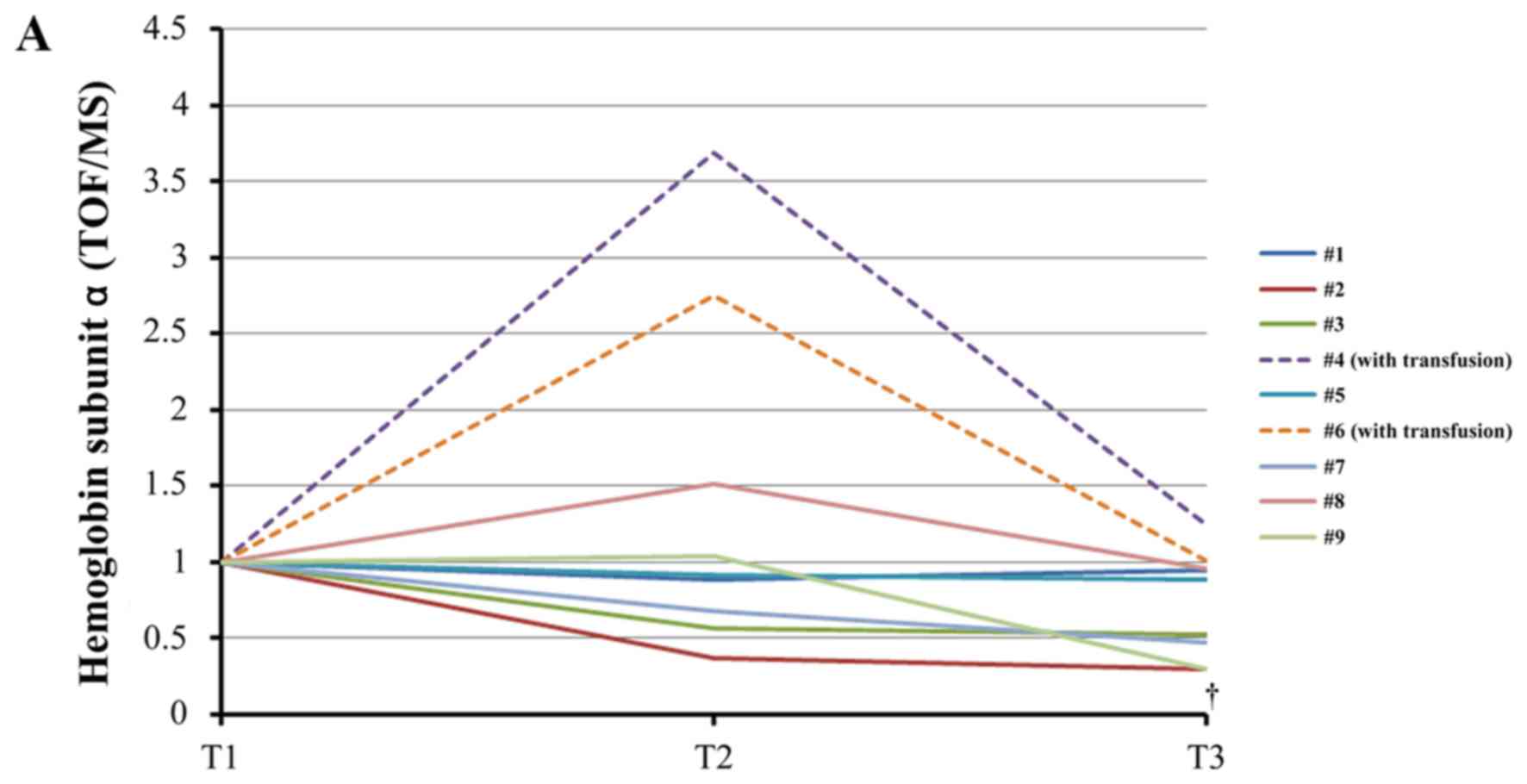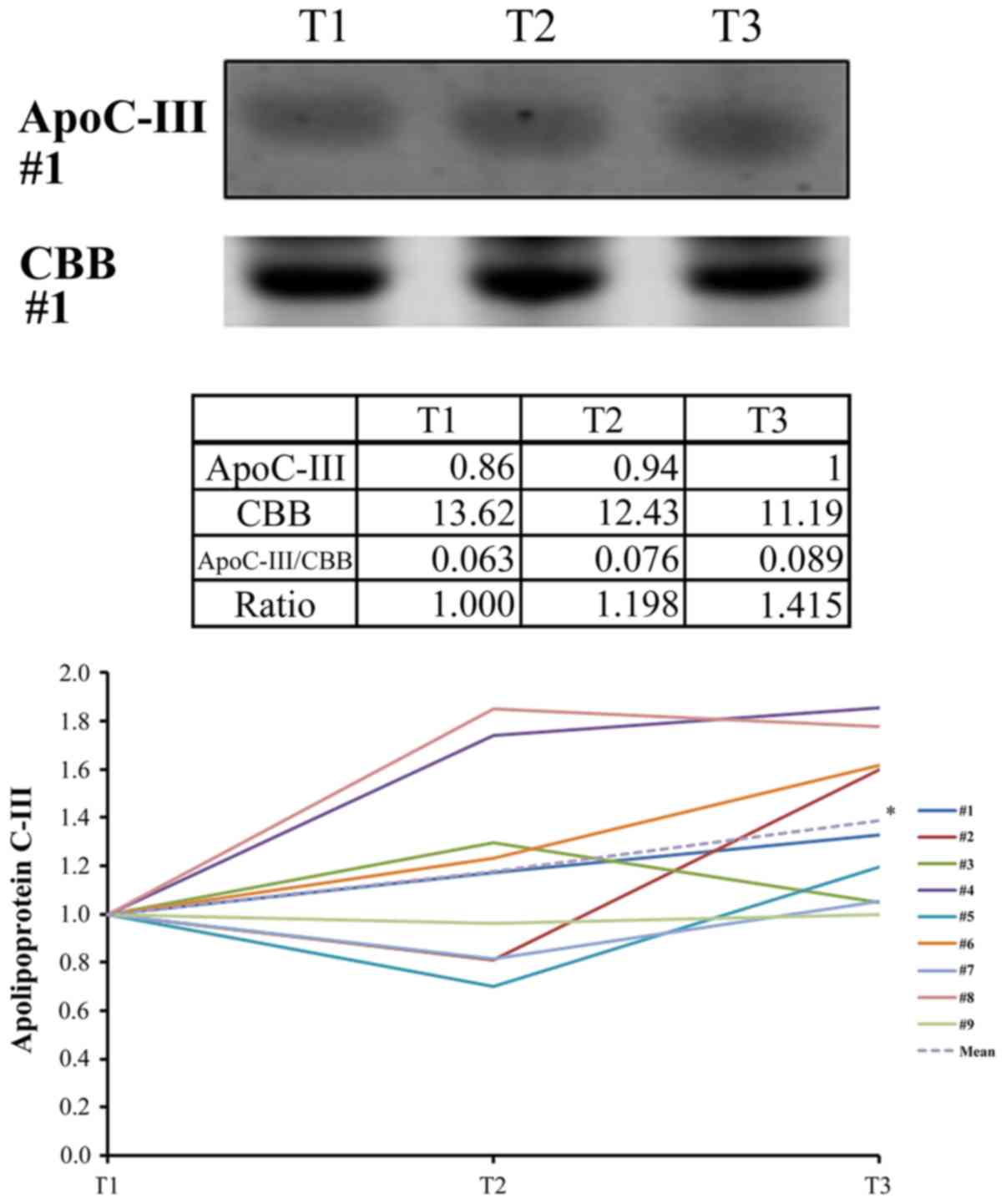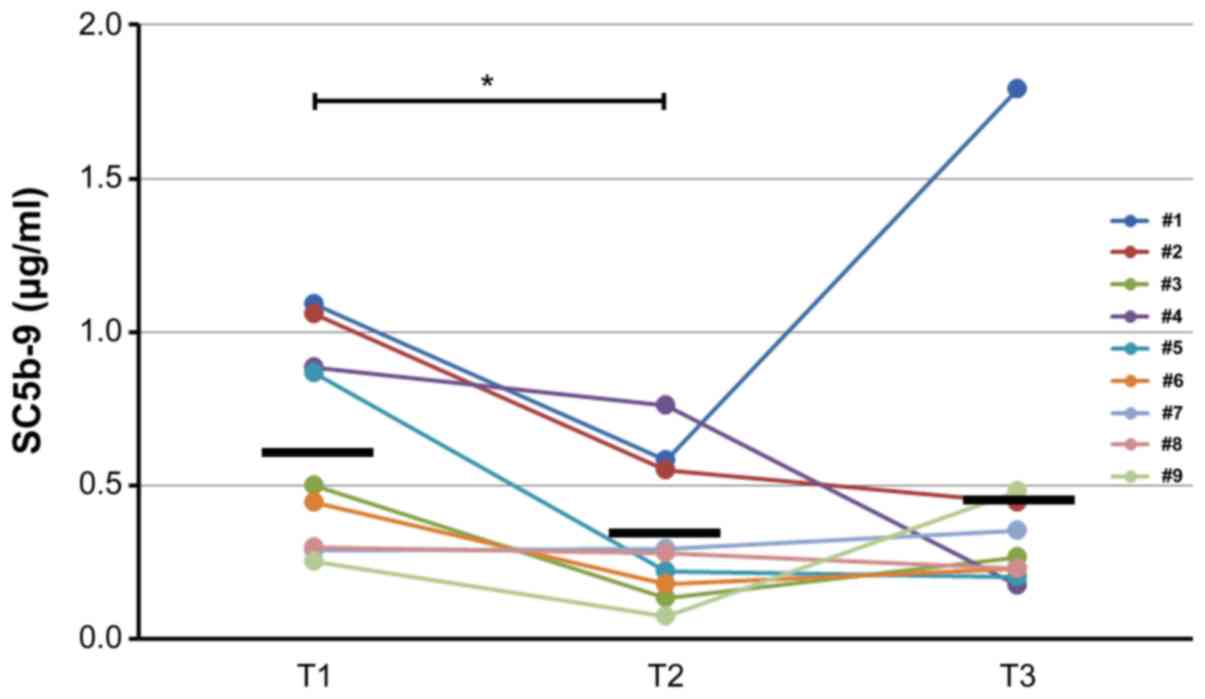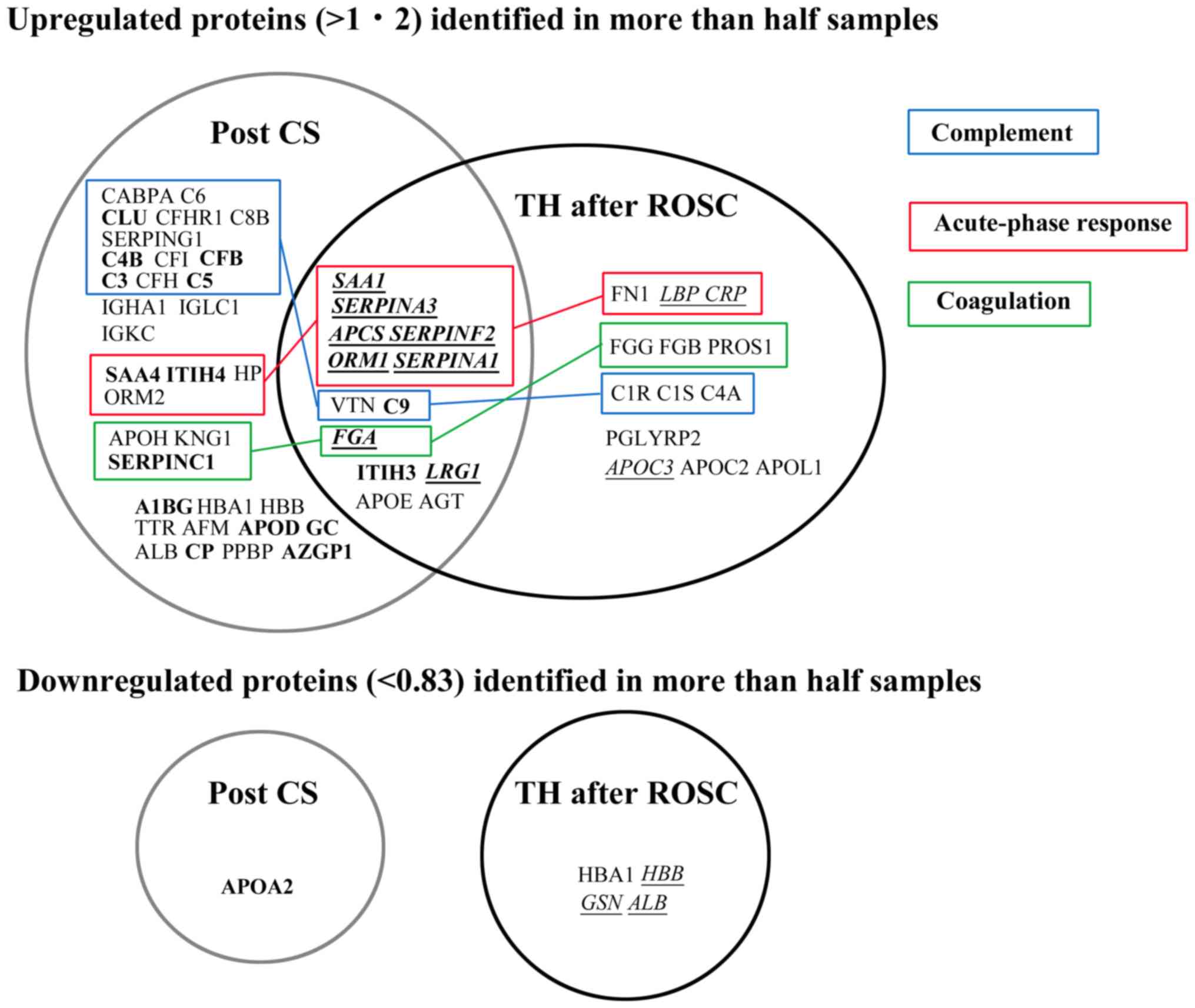|
1
|
Geocadin RG, Wijdicks E, Armstrong MJ,
Damian M, Mayer SA, Ornato JP, Rabinstein A, Suarez JI, Torbey MT,
Dubinsky RM and Lazarou J: Practice guideline summary: Reducing
brain injury following cardiopulmonary resuscitation. Report of the
guideline development, dissemination and implementation
subcommittee of the American academy of neurology. Neurology.
88:1–9. 2017. View Article : Google Scholar
|
|
2
|
Callaway CW, Donnino MW, Fink EL, Geocadin
RG, Golan E, Kern KB, Leary M, Meurer WJ, Peberdy MA, Thompson TM
and Zimmerman JL: Part 8: Post-cardiac arrest care. 2015 American
Heart Association guidelines updates for cardiopulmonary
resuscitation and emergency cardiovascular care. Circulation 132
(18 Suppl 1). S465–S482. 2015. View Article : Google Scholar
|
|
3
|
Bro-Jeppesen J, Kjaergaard J, Wanscher M,
Nielsen N, Friberg H, Mjerre M and Hassager C: Systemic
inflammatory response and potential prognostic implications after
out-of-hospital cardiac arrest: A study of the target temperature
management trial. Crit Care Med. 43:1223–1232. 2015. View Article : Google Scholar : PubMed/NCBI
|
|
4
|
Nolan JP, Neumar RW, Adrie C, Aibiki M,
Berg RA, Bottinger BW, Callaway C, Clark RS, Geocadin RG, Jauch EC,
et al: Post-cardiac syndrome: Epidemiology, pathophysiology,
treatment and prognostication. A scientific statement from the
international liaison committee on resuscitation; the American
heart association emergency cardiovascular care committee; the
council on cardiovascular surgery and anesthesia; the council on
cardiopulmonary, perioperative, and critical care; the council on
clinical cardiology; the council on stroke. Resuscitation.
79:350–379. 2008. View Article : Google Scholar : PubMed/NCBI
|
|
5
|
Nakashima R, Hifumi T, Kawakita K, Okazaki
T, Egawa S, Inoue A, Seo R, Inagaki N and Kuroda Y: Critical care
management focused on optimizing brain function after cardiac
arrest. Circ J. 81:427–439. 2017. View Article : Google Scholar : PubMed/NCBI
|
|
6
|
Bro-Jeppesen J, Kjaergaard J, Wanscher M,
Nielsen N, Friberg H, Bjerre M and Hassager C: The inflammatory
response after out-of-hospital cardiac arrest is not modified by
targeted temperature management at 33°C or 36°C. Resuscitation.
85:1480–1487. 2014. View Article : Google Scholar : PubMed/NCBI
|
|
7
|
Adrie C, Adib-Conquy M, Laurent I, Monchi
M, Vinsonneau C, Fitting C, Fraisse F, Dinh-Xuan T, Carli P,
Spaulding C, et al: Successful cardiopulmonary resuscitation after
cardiac arrest as a ‘sepsis-like’ syndrome. Circulation.
106:562–1568. 2002. View Article : Google Scholar : PubMed/NCBI
|
|
8
|
Skibsted S, Bhasin MK, Aird WC and Shapiro
NI: Bench-to bedside review: Future novel diagnosis for sepsis-a
systems biology approach. Crit Care. 17:2312013. View Article : Google Scholar : PubMed/NCBI
|
|
9
|
Wu L, Candille SI, Choi Y, Xie D, Jian L,
Li-Pook-Than J, Tang H and Snyder M: Variation and genetic control
of protein abundance in humans. Nature. 499:79–82. 2013. View Article : Google Scholar : PubMed/NCBI
|
|
10
|
Oda T, Yamaguchi A, Yokoyama M, Shimizu K,
Toyota K, Nikai T and Matsumoto K: Plasma proteomic changes during
hypothermic and normothermic cardiopulmonary bypass in aortic
surgeries. Int J Mol Med. 34:947–956. 2014.PubMed/NCBI
|
|
11
|
Oda T, Yamaguchi A, Shimizu K, Nikai T and
Matsumoto K: Does the rewarmed heart restore the myocardial
proteome to that of the precooled state? Circ J. 79:2648–2658.
2015. View Article : Google Scholar : PubMed/NCBI
|
|
12
|
Huang DW, Sherman BT and Lempicki RA:
Bioinformatics enrichment tools: Paths toward the comprehensive
functional analysis of large gene lists. Nucleic Acids Res.
37:1–13. 2009. View Article : Google Scholar : PubMed/NCBI
|
|
13
|
Huang da W, Sherman BT and Lempicki RA:
Systematic and integrative analysis of large gene lists using DAVID
bioinformatics resources. Nat Prot. 4:44–57. 2009. View Article : Google Scholar
|
|
14
|
Ashburner M, Ball CA, Blake JA, Botstein
D, Butler H, Cherry JM, Davis AP, Dolinski K, Dwight SS, Eppig JT,
et al: The gene ontology consortium. gene ontology: Tool for the
unification of biology. Nature Genet. 25:25–29. 2000. View Article : Google Scholar : PubMed/NCBI
|
|
15
|
Lancaster TS, Jefferson SJ, Hunter JC,
Lopez V, Van Eyk JE, Lakatta EG and Korzick DH: Quantitative
proteomic analysis reveals novel mitochondrial targets of estrogen
deficiency in the aged female rat heart. Physiol Genomics.
44:957–969. 2012. View Article : Google Scholar : PubMed/NCBI
|
|
16
|
Beurskens CJ and Jeffermans NP: Changes in
the inflammatory response following cardiac arrest: A matter of
ischemia/reperfusion or induced hypothermia? Crit Care Med.
40:3105–3106. 2012. View Article : Google Scholar : PubMed/NCBI
|
|
17
|
Satoh H, Yamada K, Maniwa T, Oda T and
Matsumoto K: Monitoring of serial presurgical and postsurgical
changes in the serum proteome in a series of patients with calcific
aortic stenosis. Dis Markers. 2015:694120112015. View Article : Google Scholar
|
|
18
|
Hall R, Smith MS and Rocker G: The
systemic inflammatory response to cardiopulmonary bypass:
Pathophysiological, therapeutic and pharmacological considerations.
Anesth Analg. 85:766–782. 1997. View Article : Google Scholar : PubMed/NCBI
|
|
19
|
Kouchoukos NT, Blackstone EH, Hanley FL
and Kirklin JK: Hypothermia, circulatory arrest and cardiopulmonary
bypass. Cardiac surgery. Fourth. Kouchoukos NT, Blackstone EH,
Hanley FL and Kirklin JK: ELSEVIER; Philadelphia: pp. 67–132.
2012
|
|
20
|
Stoppelkamp S, Veseli K, Stang K,
Schlensak C, Wendel HP and Walker T: Identification of predictive
early biomarkers for sterile-SIRS after cardiovascular surgery.
PLOS One. 10:e01355272015. View Article : Google Scholar : PubMed/NCBI
|
|
21
|
Zakkar M, Taylor K and Hornick PI: Immune
system and inflammatory response to cardiopulmonary bypass.
Cardiopulmonary bypass: Principles and practice. 3rd. Gravlee GP,
Davis RF, Stammers AH and Ungerleider RM: Wolters Kluwer/Lippincott
Williams & Wilkins; Philadelphia, PA: pp. 321–337. 2008
|
|
22
|
Ye RD and Sun L: Emerging functions of
serum amyloid A in inflammation. J Leukoc Biol. 98:923–929. 2015.
View Article : Google Scholar : PubMed/NCBI
|
|
23
|
Bisschops LL, Hoedemaekers CW, Mollnes TE
and van der Hoeven JG: Rewarming after hypothermia after cardiac
arrest shifts the inflammatory balance. Crit Care Med.
40:1136–1142. 2012. View Article : Google Scholar : PubMed/NCBI
|
|
24
|
Bisschops LL, van der Hoeven JG, Mollnes
TE and Hoedemaekers CW: Seventy-two hours of mild hypothermia after
cardiac arrest is associated with a lowered inflammatory response
during rewarming in a prospective observational study. Crit Care.
18:5462014. View Article : Google Scholar : PubMed/NCBI
|
|
25
|
Beurskens CJ, Horn J, de Boer AM, Schultz
MJ, van Leeuwen EM, Vroom MB and Jeffermans NP: Cardiac arrest
patients have an impaired response, which is not influenced by
induced hypothermia. Crit Care. 18:R1622014. View Article : Google Scholar : PubMed/NCBI
|
|
26
|
Polderman KH: Mechanisms of action,
physiological effects, and complications of hypothermia. Crit Care
Med 37 (7 Suppl). S186–S202. 2009. View Article : Google Scholar
|
|
27
|
Reed GL: Platelet secretory mechanisms.
Semin Thromb Hemost. 30:441–450. 2004. View Article : Google Scholar : PubMed/NCBI
|
|
28
|
Estevez B and Du X: New concepts and
mechanisms of platelet activation signaling. Physiology (Bethesda).
32:162–177. 2017.PubMed/NCBI
|
|
29
|
Timmermans K, Kox M, Gerretsen J, Peters
E, Scheffer GJ, van der Hoeven JG, Pickkers P and Hoedemaekers CW:
The involvement of danger-associated molecular patterns in the
development of immunoparalysis in cardiac arrest patients. Crit
Care Med. 43:2332–2338. 2015. View Article : Google Scholar : PubMed/NCBI
|
|
30
|
Esmon CT: Crosstalk between inflammation
and thrombosis. Maturitas. 61:122–131. 2008. View Article : Google Scholar : PubMed/NCBI
|
|
31
|
Opal SM: Interactions between coagulation
and inflammation. Scand J Infect Dis. 35:545–554. 2003. View Article : Google Scholar : PubMed/NCBI
|
|
32
|
Gong P, Zhao H, Hua R, Zhang M, Tang Z,
Mei X, Cui J and Li C: Mild hypothermia inhibits systemic and
cerebral complement activation in a swine model of cardiac arrest.
J Cereb Blood Flow Metab. 35:1289–1295. 2015. View Article : Google Scholar : PubMed/NCBI
|
|
33
|
Elvington A, Atkinson C, Zhu H, Yu J,
Takahashi K, Stahl GL, Kindy MS and Tomlinson S: The alternative
complement pathway propagates inflammation and injury in murine
ischemic stroke. J Immunol. 189:4640–4647. 2012. View Article : Google Scholar : PubMed/NCBI
|
|
34
|
Lindberg S, Pedersen SH, Mogelvang R,
Galatius S, Flyvbjerg A, Jensen JS and Bjerre M: Soluble form of
membrane attack complex independently predicts mortality and
cardiovascular events in patients with ST-elevation myocardial
infarction treated with primary percutaneous coronary intervention.
Am Heart J. 164:786–792. 2012. View Article : Google Scholar : PubMed/NCBI
|
|
35
|
Kotimaa J, Van del Pol P, Leijtens S,
Klar-Mohammad N, Schilders G, Daha MR, Rutjes H and van Kooten C:
Functional assessment of rat complement pathway activities and
quantification of soluble C5b-9 in an experimental model of renal
ischemia/reperfusion injury. J Immunol Methods. 412:14–23. 2014.
View Article : Google Scholar : PubMed/NCBI
|
|
36
|
Gutteridge JM: Iron promoters of the
Fenton reaction and lipid peroxidation can be released from
haemoglobin by peroxides. FEBS Lett. 201:291–295. 1986. View Article : Google Scholar : PubMed/NCBI
|
|
37
|
Kapralov A, Vlasova II, Feng W, Maeda A,
Walson K, Tyurin VA, Huang Z, Aneja RK, Carcillo J, Bayir H, et al:
Peroxidase activity of hemoglobin-haptoglobin complexes: covalent
aggregation and oxidative stress in plasma and macrophages. J Biol
Chem. 284:30395–30407. 2009. View Article : Google Scholar : PubMed/NCBI
|
|
38
|
Meyer C, Heiss C, Drexhage C, Kehmeier ES,
Balzer J, Mühfeld A, Merx MW, Lauer T, Kühl H, Floege J, et al:
Hemodialysis-induced release of hemoglobin limits nitric oxide
bioavailability and impairs vascular function. J Am Coll Cardiol.
55:454–459. 2010. View Article : Google Scholar : PubMed/NCBI
|
|
39
|
Shaver CM, Upchurch CP, Janz DR, Grove BS,
Putz ND, Wickersham NE, Dikalov SI, Ware LB and Bastarache JA:
Cell-free hemoglobin: A novel mediator of acute lung injury. Am J
Physiol Lung Cell Mol Physiol. 310:L532–L541. 2016. View Article : Google Scholar : PubMed/NCBI
|
|
40
|
O'Neal JB, Shaw AD and Billings FT IV:
Acute kidney injury following cardiac surgery: Current
understanding and future directions. Crit Care. 20:1872016.
View Article : Google Scholar : PubMed/NCBI
|
|
41
|
Yoo H, Ku SK, Kim SW and Bae J: Early
diagnosis of sepsis using serum hemoglobin subunit beta.
Inflammation. 38:394–399. 2015. View Article : Google Scholar : PubMed/NCBI
|
|
42
|
Kitamura H, Nagano A and Kitano E:
Hemolysis of normal human erythrocytes by autologous serum
complement. Int Arch Allergy Immunol. 100:209–214. 1993. View Article : Google Scholar : PubMed/NCBI
|
|
43
|
Kristiansen M, Graversen JH, Jacobsen C,
Sonne O, Hoffman HJ, Law SA and Moestrup SK: Identification of the
hemoglobin scavenger receptor. Nature. 409:198–201. 2001.
View Article : Google Scholar : PubMed/NCBI
|
|
44
|
Thomsen JH, Etzerodt A, Svendsen P and
Moestrup SK: The haptoglobin-CD163-heme oxygenase-1 pathway for
hemoglobin scavenging. Oxid Med Cell Longev. 2013:5236522013.
View Article : Google Scholar : PubMed/NCBI
|
|
45
|
Vermeulen Windsant IC, de Wit NC, Sertorio
JT, van Bijnen AA, Ganushchak YM, Heijmans JH, Tanus-Santos JE,
Jacobs MJ, Maessen JG and Buurman WA: Hemolysis during cardiac
surgery is associated with increased intravascular nitric oxide
consumption and perioperative kidney and intestinal tissue damage.
Front Physiol. 5:3402014. View Article : Google Scholar : PubMed/NCBI
|
|
46
|
Du R, Winarsih I, Ho B and Ding JL:
Lipid-free apolipoprotein A-I exerts an antioxidant role against
cell-free hemoglobin. Am J Clin Exp Immunol. 1:33–48.
2012.PubMed/NCBI
|
|
47
|
Hanson MS, Xu H, Flewelen TC, Holzhauer
SL, Retherford D, Jones DW, Frei AC, Pritchard KA Jr, Hillery CA,
Hogg N and Wandersee NJ: A novel hemoglobin-binding peptide reduces
cell-free hemoglobin in murine hemolytic anemia. Am J Physiol heart
Circ Physiol. 304:H328–H336. 2013. View Article : Google Scholar : PubMed/NCBI
|
|
48
|
Sun L and Ye RD: Serum amyloid A1:
Structure, function and gene polymorphism. Gene. 583:48–57. 2016.
View Article : Google Scholar : PubMed/NCBI
|















